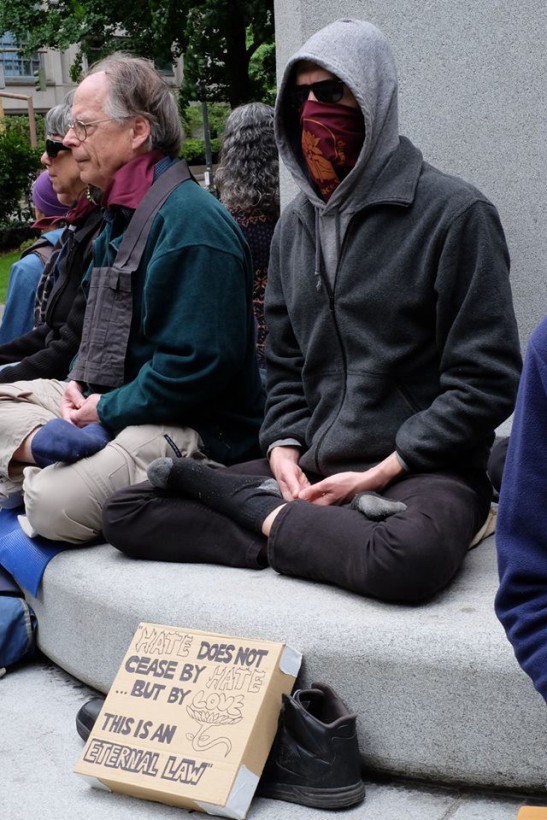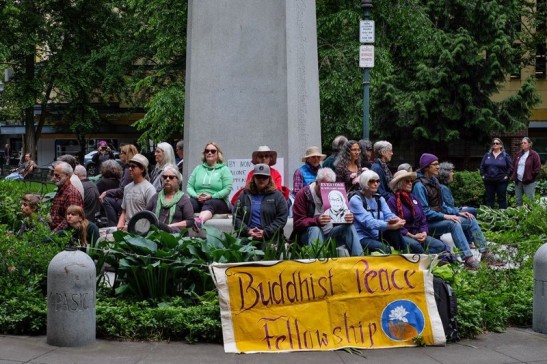Perspectives on Anti-Fascist Practice
From the perspective of Buddhist dharma, can we actually ‘love’ (have empathy and compassion for) violent racists? or only wish for an end to their suffering? The following two presentations show a range of perspectives. The first is an interview with an ex-Neo Nazi (who is not known to be a Buddhist) who works to bring white youth out of the Neo-Nazi movement; and the second by a Buddhist activist involved in anti-fascist demonstrations Portland, Oregon.
Ex-Neo Nazi shares how he reaches out to Nazi/White Supremacists to get them out of violent racist groups.
“I don’t love them”—Meet a Buddhist Anti-fascist

Kathryn Kendall is a Buddhist anti-fascist.
At first blush, the label may appear an oxymoron. Buddhism is known for serenity and tolerance; anti-fascism for censorship and, if necessary, violence. The Buddhist dons a quiet grin; the anti-fascist a black bandana.
After Charlottesville, however, American Buddhists are struggling to reconcile the religion’s perceived passivity with the need to protect vulnerable communities from white supremacists.
“From a Buddhist standpoint, compassion is not a violent act. But compassion can be quite wrathful,” tweeted Ethan Nichtern, a senior teacher in the Shambhala Buddhist tradition, on Friday. On the second day of the Charlottesville protest African American Buddhist teacher Lama Rod Owens asked, “will white dharma teachers start taking racism seriously?”
Kendall, 74, a Buddhist practitioner for 59 years and a member of the Portland Buddhist Peace Fellowship for three, spoke to me about why she wouldn’t punch a Nazi but stands with those who do. She also reflected on a meditation counter-protest the Portland Buddhist Peace Fellowship carried out at a white nationalist rally on June 4, just nine days after a white man shouting Islamophobic hate-speech allegedly killed two men on a light-rail train who tried to intervene on behalf of fellow passengers.
The interview was edited for clarity and condensed for length. It is a consolidation of two conversations that took place on June 19 and August 17 as well as email correspondence.
How are you feeling in the aftermath of Charlottesville? I think Charlottesville showed us that the fascist movement is much larger than we realized. There was that long parade of people with tiki torches chanting hideous anti-black, anti-immigrant and anti-semitic chants. Things are worse than any of us knew, until now. Speaking for myself and not for the Buddhist Peace Fellowship, I’m so grateful for the anti-fascists. I consider them brave, wise, good and courageous.
How do you reconcile Buddhist teachings on nonviolence with your support for anti-fascists who endorse violent tactics? People say it’s wrong to do property damage and to punch a Nazi. I hear that but I think if I were in Germany when Hitler came to power, I would have stood with people who punched Nazis. I think you can’t punch a Nazi nonviolently and I wouldn’t do it, but I’m grateful for young people who will.
You said you wouldn’t punch a Nazi but you stand with those who do. Why? The violence and racism of the alt-right is so disturbing that I’m not sure that peaceful resistance will do the job. I respect Buddhists who oppose violence and wouldn’t countenance punching a Nazi. At the same time, I respect anti-fascists who say if we don’t stand up to Nazis, they’ll take over. I don’t know if that’s true but I see what the anti-fascists are saying.
I cannot help loving these young [anti-fascist] people. Their wish to make a better world moves me, and whether I agree with their strategies or not is irrelevant to my feelings of love for them. It gives me hope to see there are young people who want a more just and equitable world.

During your meditation protest in Portland, what did you learn about how to grapple with the fear of a potentially violent situation? The thing that is so crucial in telling the story [of our meditation protest] is that many people felt it was wrong for us to go at all. The Unitarians had a big meeting and said nobody should go downtown because it would contribute to the volatility. Many friends said, “Don’t do this because the alt-right has guns and could mow you all down.” By the time June 4th arrived we knew thousands were converging on downtown Portland. Many of us were frightened. Many people were calling with panicked voices. I said, “This is our service. We just need to be in ‘don’t know’ mind. There could be guns and killing. We have to be in ‘don’t know’ mind.”
We had picked where we would meditate. Ironically it was a war monument, surrounded by circular marble steps. Initially about 60 people came for the beginning of the meditation. We had people with signs offering to explain the protest to passersby — that was my role. We soon had people joining the meditation on benches, or on the grass. We had one masked anarchist join. By the end we had over 100 people sitting with us. I was approached by many people who had tears in their eyes, saying, “Thanks for doing this. It’s beautiful.”
Afterward, I led a metta meditation. I said, “Look at each other’s eyes. Be grateful for each other. Please wish for the safety of all beings for the rest of the day. May all beings be safe.” We bowed to each other. That was it.
I see something this hideous and this ugly, and say we need to stand up for what we love and what we defend. I still say the person who has been most inspiring to me is Bhikkhu Bodhi.
How so? When he spoke with James Baraz on Dharma Seed he described “conscientious compassion.” He talked about “justified moral outrage”; he’s the only person in the Buddhist community using those three words. He talks about when something is so terribly wrong that we can do nothing but admit we are outraged by it. This is not a political issue about which everybody needs to hear all sides. That’s ridiculous. A side does not need to be heard: the side that harms people. The side that says, “carry guns and hurt people.” It does not need to be heard. This is not a free speech issue. I’m in that same position of what I feel is justified moral outrage. I’m grateful to him for those words.

In embracing outrage, do you risk preventing yourself from seeing the the situation clearly? When I see clearly that a group is doing all they can to increase the suffering of others, it’s very clear those people are a danger to all that I love and care about, and to right speech and right action. That danger is not a delusion. We’re not being deluded about the danger of people who want to harm others and cause suffering. People will say, “Of course, you never think you’re deluded.” But how could a group say they want to kill Jews and Black people and that not be wrong speech and wrong action. If the group has the power to put those actions to work, it’s our moral responsibility as Buddhists to stand in the way of its being able to accomplish that. I don’t feel confused about that.
Other Buddhists may make other choices. These events certainly put our consciousness to the test. They give us something to work with we have not had to work with before. It’s an amazing opportunity for study and challenge. Many people are coming forward and joining movements in ways not seen in my lifetime. The closest I’ve seen to it was resistance to the Vietnam war. Then, Thich Nhat Hanh was the leader we looked to. We heard him saying the violence was causing great suffering and we needed to put our energy as Buddhists to creating peace where we were, to putting peaceful footsteps on earth. I believe we can do that as we stand up to the alt-right, but I don’t think we can do that sitting on our couches.
For liberal white Americans watching the events in Charlottesville, discomfort can arise when confronted with racial peers who display noxious views and behavior. But do such onlookers risk distancing themselves from their own complicity in systems of white supremacy? If so, how do they grapple with that sort of aversion? Humility. I think white people need to have the humility to realize we are all racists. We were all brought up in a racist society, and we have privilege we cannot see. We have to be working with that all the time. The fact that there are people who are more harmful does not excuse us from continuing to do our work. Our humility as Buddhists — the awareness that we too make mistakes, we too are foolish, we too are deluded — is where we have to find that poison in ourselves. It does not require us to be kind to racists, extend love to them or put them on our altars. I hear people say these things and I’m appalled. I wish for people to come out of suffering, but I don’t love them. I don’t think I’m called to love people causing harm. I see in myself the capacity for hatred. I see in myself the capacity to do harm to others. And I need to work on that, particularly with regard to white supremacy. As a white person with that privilege, it’s my moral calling — my dharma — to be aware of ways I have privilege and to be humble going forward.
If Buddhists want to join anti-fascist protests with a religious bent, how can they get involved? Talk to your sangha and get them out. If one sangha can talk to another sangha, that would be great. We’re realizing we need to find out who’s Buddhist in our area. We tend to have stayed in enclaves — Zen people, Vipassana people. It’s time for us to find each other and stand with each other.

Recent Comments